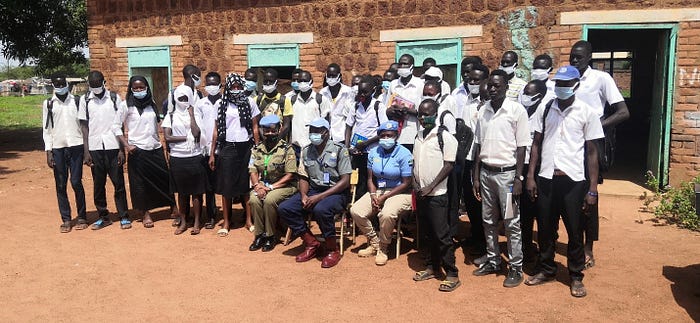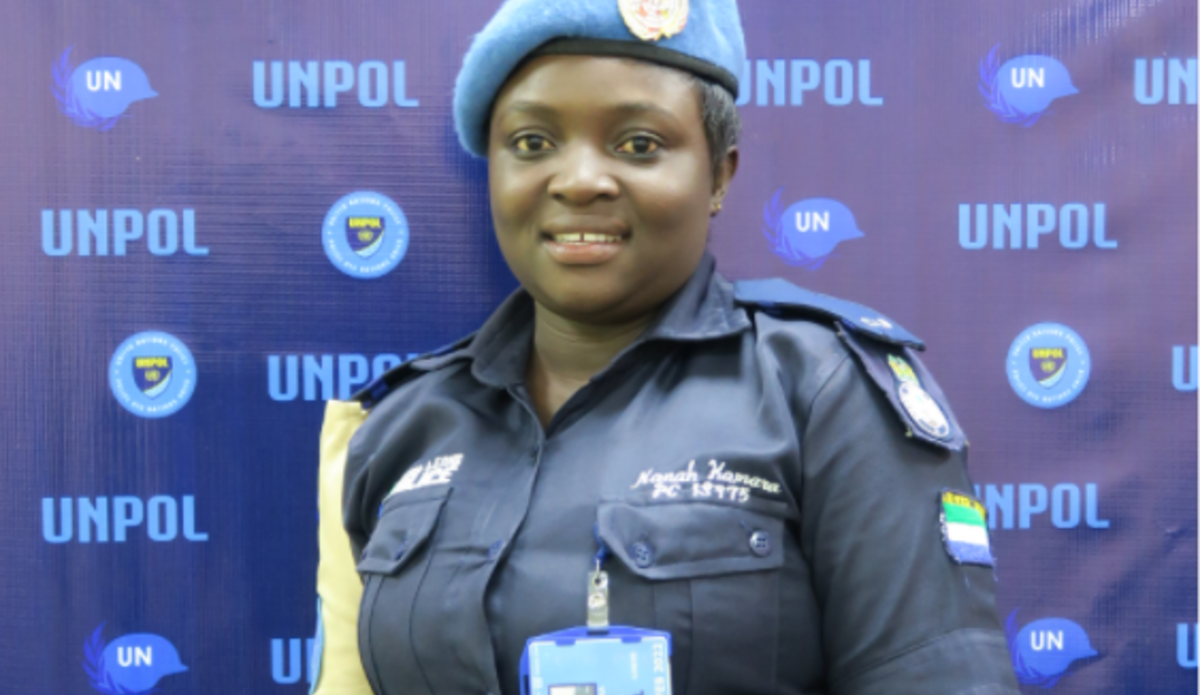The story of Nanah Kamara
From the mid-1990s to the early 2000s, the Mano River Basin sub-region of West Africa was ravaged by war and violence that started in Liberia, and quickly spread to neighbouring countries. To help restore peace and protect populations throughout West Africa, the UN Security Council deployed a total of six peacekeeping operations across the region from 1993 to 2018.
Among these operations was the United Nations Mission in Sierra Leone (UNAMSIL), which was established in 1999 and, to this day, is considered as one of UN Peacekeeping’s biggest success stories. In just six years of operation, the mission managed to overcome major political and military challenges and, among others, contributed to the successful disarmament, demobilization and reintegration of more than 75,000 ex-combatants. It also facilitated the preparation and conduct of elections, provided critical assistance and training to build up the country’s security sector, assisted the Government in reasserting its control over diamond-mining, and left Sierra Leone on an “immutable course towards peace and development” at its departure in 2005.
Nanah Kamara has suffered the brutality of war as a child in Sierra Leone, but has also experienced the transformative impact of a UN Peacekeeping operation. Mother of a two-year old daughter, she now had to leave her family back home when deployed to South Sudan to serve as a police officer with the United Nations Mission in South Sudan (UNMISS). Joining peacekeeping was her childhood dream come true, and has taught her to be more tolerant and open-minded.
From living in a country that hosted a peacekeeping mission in the past to becoming a peacekeeper herself, let’s discover Nanah’s inspiring story in her own words.
I decided to become a peacekeeper after I saw the work of the United Nations Mission in Sierra Leone (UNAMSIL) in my country, Sierra Leone, between 2000 to 2005, after 11 years of civil war. Whenever the UN peacekeepers visited our community as a child, I would always go and listen to whatever they said. It was at that time that I decided I will one day become a police officer and a peacekeeper.
Leaving my family and friends was not an easy decision. When I informed my family that I will be going on a peacekeeping mission, they were scared because they were thinking that there is still war in South Sudan. My mother was so scared that something bad would happen to me, but after explaining to her more about the mission, she was relieved. As for my husband, he was thinking about our two-year-old daughter, who is still young and needs the care of her mother. Since he is also a police officer, though, he encouraged me to be strong and go to South Sudan to serve humanity.

Every day, I wake up in the morning, pray, do my radio check, and go to the office. My duties involve going out for confidence and trust-building patrols in camps for internally displaced persons (IDPs) and at police stations. I conduct sensitization at schools and the general community, workshops for the law enforcement agencies of South Sudan, community watch group members and IDP Camp leaders, and I submit my daily activity report to the appropriate authorities.
As an UNPOL officer, one of my major tasks is to train local counterparts from the South Sudan National Police Services in patrol operations, investigative techniques and handling suspects in custody. Basically, I work to build their capacity in key policing areas. My colleagues and I also help them build their skills in taking statements, writing reports, conducting interviews with people who may be suspected of a crime and so forth. Additionally, I am also one of the COVID-19 support officers in Wau where I am deployed. In this role, I make sure that all pandemic prevention and mitigation measures are being adhered to by UNMISS personnel so that we, as peacekeepers, stay safe ourselves and protect the communities we are here to serve.
My overall experience as a UN peacekeeper is very interesting and challenging. As a peacekeeper, I come from a country whose cultures and practices are different from the ones here in South Sudan, so it is somewhat challenging.
On my first day of patrol, I went out for Technical Assistance and Advice patrol in my field office together with my teammates. We were patrolling outside the IDP camp, when a group of boys attacked us and started pelting stones at us. I was so afraid that I almost fainted. I then advised my teammates not to be afraid, even though I was afraid.
I called one of the boys and asked him why they were pelting stones at us. The boy replied that whenever UN Peacekeepers are patrolling, they will not give them money, so they wanted to take our vehicle. I asked him to tell his friends to stop pelting stones and listen to what I want to say to them and, to my surprise, he agreed. My teammates and I explained to them that we are here to help build their confidence for a brighter and better South Sudan. I also talked to them on the importance of education and, in the end, they apologized. I will never forget that day, as it helped me build my confidence to be able to carry out my duties without fear.
Being a young female peacekeeper here in South Sudan, nothing is more important to me than seeing the hopes and smiles on the faces of the people of South Sudan, especially women and children. I know what it is like living in a war-affected country because I have also experienced it before. Usually, when my teammates and I go out to raise awareness on community policing, gender-based violence and conflict-related sexual violence cases, I realize that the people are willing and ready to learn because they want to build a better South Sudan.

Another thing that I consider rewarding as a UN Peacekeeper is the impact that I am having in the lives of female students, especially the ones in senior school. Whenever I go to schools for awareness-raising sessions, I take advantage of my young age to help them understand that even if you are young, you can still be a good leader, and that women should not only be in the kitchen, but can also make their voices heard across the world.
Being a peacekeeper has instilled respect for diversity in me. Working in a community where you must interact with people with different backgrounds and beliefs is really challenging, but it has taught me that for us to make this world a better place, we have to learn to respect our diverse ways of living. As the saying goes, “the beauty of the world lies in the diversity of its people”.
Source: https://unpeacekeeping.medium.com/



